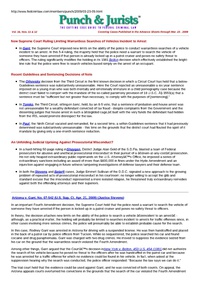In an important Fourth Amendment decision, the Supreme Court held that the police need a warrant to search the vehicle of someone they have arrested if the person is locked up in a patrol cruiser and poses no safety threat to officers.
In theory, the decision attaches new limits …
In an earlier, unpublished decision reported at U.S. v. Paul, 239 Fed. Appx. 353 (9th Cir. Aug. 17, 2007) (P&J, 07/16/07) (“Paul !”), a panel from the Ninth Circuit reversed a within-Guidelines sentence of 16 months as substantively unreasonable. That ruling evoked a lot of attention because it was …
In conviction for one count of conspiracy to possess with intent to distribute and to distribute an unspecified quantity of cocaine, denial of petition to reduce imprisonment pursuant to 18 U.S.C. § 3582(c)(2) is affirmed where: 1) petitioner's appeal challenged only the calculation of the base offense level, and …
The defendant was convicted at trial of multiple counts of insider trading. During the trial, the district court granted the Government's motion to exclude defendant's expert-testimony evidence. On appeal, in a decision reported at 519 F.3d 1140, a divided reversed and remanded for a new trial. The Tenth Circuit …
This is the first reported decision to discuss an issue that has not previously been addressed by any Federal court - namely, the circumstances under which two separate, but related, Guideline provisions apply - namely U.S.S.G. §§ 2M3.2 and 2M3.3. Both of those provisions relate to the illegal gathering …
Here the en banc Court held, by an 8-5 vote, that a sentence of probation for a wealthy defendant convicted of tax fraud was not unreasonable despite complaints from the dissenting judges that the sentence would promote disrespect for the law.
The issue before the en banc Third …
This ruling, and Judge Sullivan's similar ruling in Batarfi v. Bush, No. 05-0409 (EGS) (D.D.C. Mar. 13, 2009) (which is available at https://ecf.dcd.uscourts.gov/cgi-bin/show_public_doc?2005cv0409-170), are noted as evidence of the fact that Judge Sullivan has grown weary of repeated acts of prosecutorial misconduct by Federal prosecutors in cases before his …
In this decision, Judge Gold blasted Federal prosecutors for their mean-spirited and vindictive conduct that constituted “unethical behavior” and for acting “vexatiously and in bad faith” in its prosecution of Dr. Ali Shaygan, a Miami Beach physician, who was acquitted of 141 counts of illegally prescribing painkillers. Judge Gold …
This case is noted for its holding that there is no right to counsel at crack-cocaine sentence modification proceedings pursuant to Guidelines Amendment 706 and 18 U.S.C. § 3582(c)(2). Amendment 706 (which became effective Nov. 1, 2008; and which was further amended by Guidelines Amendment 713, which became effective …
The petitioner, Mathew Musladin, was convicted of first degree murder and, after pursuing his state court remedies without success, he appealed to the Federal courts for habeas relief. After his petition was denied by the district court, the Ninth Circuit reversed in a prior decision on the ground that …
Here the Court rejected as unreasonable a below Guidelines sentence imposed in a child pornography case because the district court failed to comport with the mandates of the so-called parsimony provision of 18 U.S.C. § 3553(a).
This lengthy and intriguing child pornography sentencing decision appears to be the …
In this lengthy (66-page) decision, a divided panel from the Third Circuit vacated a probation-only sentence for tax evasion as substantively unreasonable. The majority and dissenting opinions represent the most detailed analysis we have seen to date of the Supreme Court’s decision in U.S. v. Rita, 127 S.Ct. 2456 …
